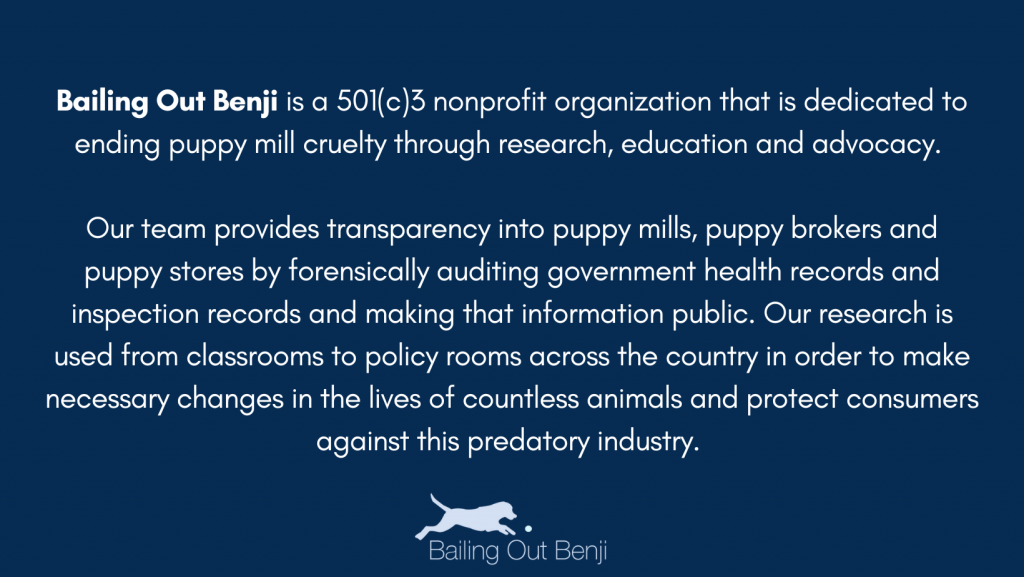
Before we begin, we want to acknowledge all of the hard work that advocates have done in order to pass legislation and ordinances in their communities! When we are relaying our research and our studies showing what has happened after the fact, it isn’t to denounce or dissuade people from working on this issue. Our research into the commercial dog breeding, pet store, sham rescue, and puppy mill world doesn’t stop once a law has been passed. We continue observing what happens after the laws go into effect, and we report the facts as we know them. When we know better, we do better- and at Bailing Out Benji, we are always striving to learn lessons and do better.
August 2025
New York’s Puppy-Mill Pipeline Law: Loopholes and Lessons
New York’s recent law banning the retail sale of commercially bred dogs, cats, and rabbits- more popularly known as the Puppy-Mill Pipeline law- was passed in an attempt to cut off a major retail market for animals being imported from puppy mills and commercial breeders. The ban, which was signed into law and took effect in December 2024, prohibits pet stores from selling those select companion animals at retail establishments and instead allows stores to partner with registered nonprofit rescues or shelters to host adoption events.
On the surface, the law appears to have had its intended effect. A few puppy-selling stores removed animals from their sales floors immediately, and a significant number closed their doors altogether rather than transition to the shelter/rescue model. But Bailing Out Benji’s latest research paints a more complicated and concerning picture. While some stores truly shut down their operations, others quickly adapted to keep moving animals to buyers without technically “selling” them in the traditional retail sense.
These adaptations take several forms. Some stores have shifted to appointment-only, avoiding the appearance of a standard retail setup. Others have migrated their operations almost entirely online, where breeder sources, transport chains, and sales practices are much harder to monitor or regulate. The result is a marketplace that still functions, but now operates in more opaque and hard-to-enforce ways.
New York is far from alone in facing this problem. States that have implemented similar bans, such as California (AB 485 and subsequent amendments) and Illinois (HB 1711), have experienced parallel challenges. In California, follow-up legislation became necessary after our investigation uncovered that some animals marketed as “rescues” were in fact coming directly from commercial breeders. The language of the original law had left just enough ambiguity for bad actors to disguise their sourcing. In Illinois, some pet stores sidestepped the rescue-only requirement by surrendering their retail licenses entirely and reclassifying themselves as “dealers,” which allows them to continue selling commercially bred puppies and kittens without violating the retail sales ban.
When New York’s bill was signed, roughly 60 pet stores in the state were actively selling puppies and kittens. They were given two years to comply with the new law. As of mid-2025, Bailing Out Benji’s online audit shows that about 17% of those stores remain in business, either through appointment-based sales or as online puppy brokers. Specifically, four pet stores appear to continue to operate with puppies or kittens for sale in physical locations, while six others have abandoned storefronts and shifted entirely to online brokering, still selling puppies in New York despite the retail ban. We are also currently investigating a handful of new 501(c)(3) organizations that are importing a concerning amount of puppies from breeders, as well as investigating operations that are acting as brokers without the proper licensing.
While the law was intended to stop the sale of commercially bred puppies and kittens in New York pet stores, these findings suggest that determined sellers can, and do, find ways to adapt. The persistence of these loopholes and strategies raises broader questions about the effectiveness of retail bans as a standalone strategy. New York’s experience mirrors that of California and Illinois, where animals continue to be imported from Midwest breeders and sold to the public, often under rebranded or restructured business models. This is why we believe that it is extremely important for advocacy organizations to continue studying the ramifications of the legislation they have passed in order to determine whether or not our strategies are working. We can’t spike the ball, call it a win, and walk off the field without checking to see if the game is still being played.
The reality is clear, though: without robust enforcement of laws, transparent supply chain tracking, and legislative language that anticipates and closes potential workarounds, retail bans may succeed in shifting how the market operates, but not necessarily in ending the pipeline from puppy mills to the public. New York’s law can be a tool for stopping puppy mills, but the state’s experience (and others like it) underscores the need for ongoing oversight, strong investigative work, and policy refinements to ensure that “puppy mill free” is more than just a slogan.

Bailing Out Benji is a small nonprofit organization based in Ames, Iowa. Our research team is focused on auditing government health records, inspection records, online marketplaces, puppy stores, and more in order to get a grasp on just how vast the puppy mill problem is and work towards a future where there are no more inhumane breeding operations.
It is our belief that through research, education, and advocacy, we will build an informed society that helps us solve that problem faster than if we did it on our own. While independently verifiable, our work is extremely unique and our research has led to industry change across the country.
If you are able, please consider making a donation to support our nonprofit! We can’t do this without you.

